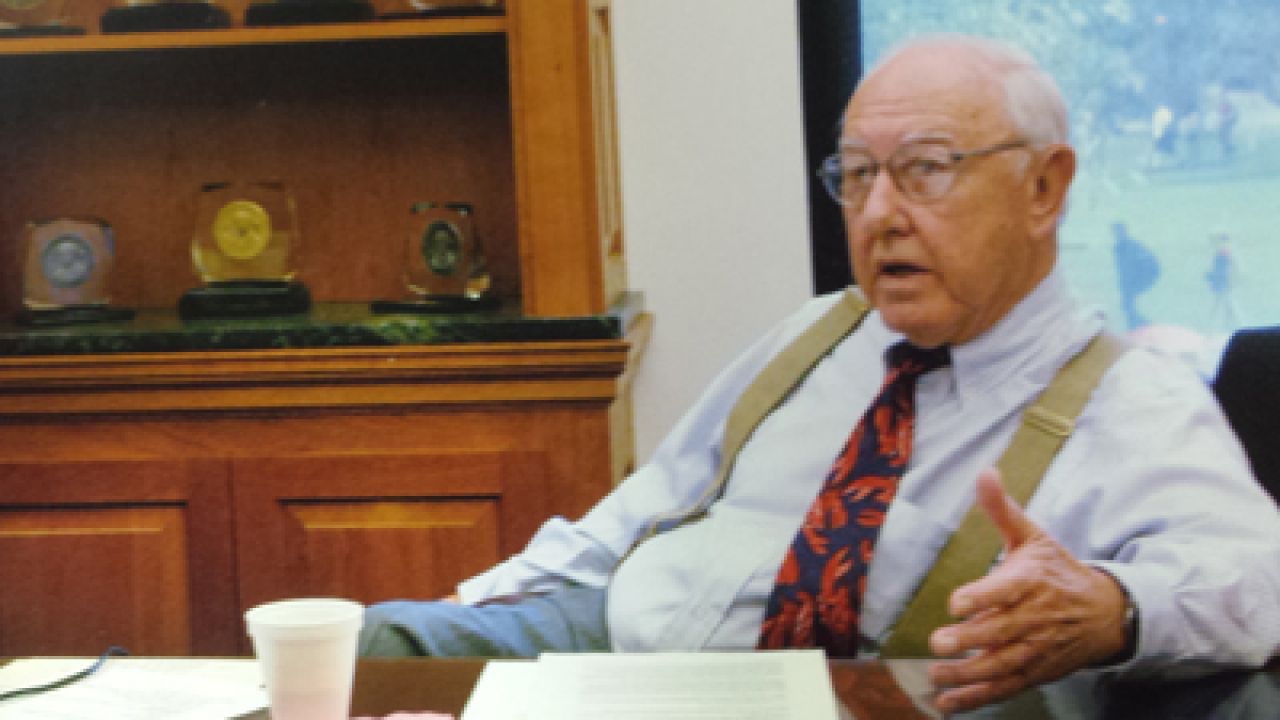August 18, 2016
Page Center mourns loss of co-founder Ed Block

Edward M. Block, co-founder of the Arthur W. Page Center for Integrity in Public Communication and the Arthur W. Page Society, died on Tuesday, Aug. 16.
A stalwart leader in public relations for decades, Block was a lifelong proponent of ethics and integrity across the industry. In 2004, along with fellow public relations leaders Larry Foster and Jack Koten, Block helped launch the Page Center, a research center in Penn State’s College of Communications that studies and advances ethics and responsibility in corporate communication and other forms of communication.
“Ed was an inspiring man to everyone who had the privilege to work with him. In our time working together, I always found him kind-hearted, helpful and incredibly wise,” said Denise Bortree, director of the Page Center and associate professor in the College of Communications. “His research and writings on Arthur W. Page have encouraged a generation of professionals and scholars to reach high levels of integrity in our work.”
WATCH Larry Foster interview Ed Block in a Page Center oral history.
Block served as senior vice president for public relations, advertising and employee information at AT&T from 1974 to 1986. It was during his time at the telephone company that he was introduced to the works of Arthur W. Page who was the first to hold Block’s position at AT&T between 1927 and 1946. Page’s commitment to honesty and integrity inspired Block.
In 1983, Block co-founded what would become the world's leading professional association for senior public relations and corporate communications executives and educators. He named the association after Page, The Arthur W. Page Society.
In 2004, with Foster, Koten and members of the College of Communications, Block co-founded the Page Center. Foster and Koten died in 2013 and 2014, respectively. The College’s dean at the time, Doug Anderson, recalled the day he met with the Center’s three founders and its first director John Nichols, then the associate dean for graduate studies at the College.
Anderson said: “Some 12 years have passed since John Nichols and I sat with three members of the Arthur W. Page Society’s Hall of Fame in a conference room in the College of Communications. The Hall-of-Fame trio—Larry Foster, Jack Koten and Ed Block—were each larger than life. John and I sat in awe as we listened to them outline their vision for the Page Center, which they summarized in a letter to the Page Society Board.”
Anderson added that the three founders decided the Page Center would represent “yet another step toward a long-term goal of enlarging the understanding of a body of work that will influence future generations of corporate executives and their public relations advisers.” The Page Board approved it unanimously.
“All three were splendid professionals—and men,” Anderson said. “Penn State will be forever grateful for their guidance, insight and support of the Page Center. We’ll always remember Ed not only for his support, but for his authenticity and kindness, qualities that matched his professional pedigree. He was a joy to work with and talk to.”
Nichols said, “Along with Larry and Jack, Ed devoted time, energy and wise counsel in building a solid foundation for the Center—which, under Denise Bortree's leadership, is growing into a major academic resource and bridge to the communication profession. Ed's passing is the end of an era—both for the Page Center and the field of public communication.”
Dean of the College of Communications Marie Hardin said, “The Page Center is part of Ed’s enduring legacy for the public relations field. I am pleased to know that what he helped establish will give impact to his deep commitment to ethics and leadership."
Block was responsible for AT&T’s corporate communications during the company’s historic divestiture of the Bell telephone companies and its expansion into international markets. He also held the additional post of assistant to the chairman of the board from 1980 until his retirement and was a member of the Office of the Chairman.
Block was also a director of AT&T International and AT&T Information Systems. He established the AT&T Foundation and was its first chairman of the board. It was on his initiative that AT&T provided the funding ($10 million a year for five years) to establish the MacNeil-Lehrer NewsHour on PBS. He was a director of C&P Telephone Company and a director of Electronic Associates, Inc. (NYSE), a New Jersey based maker of simulation computers for defense and aerospace applications. He was also a director of NCR Corporation.
In 1980, PR News chose Block as the Public Relations Professional of the Year. In 1993, he received the lifetime achievement award from Inside PR, as well as the Hall of Fame Award of the Arthur W, Page Society. In 1997, he received the Gold Anvil from the Public Relations Society of America. Most recently, he was cited by PR Week as one of the 100 most influential public relations people of the 20th century.
